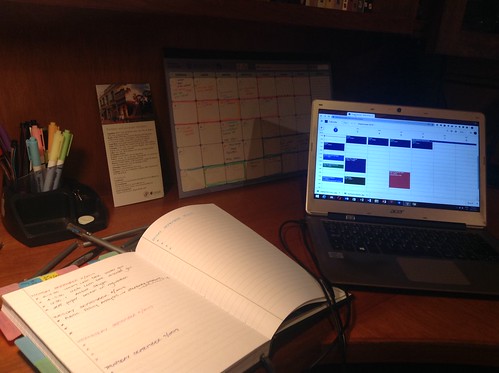It’s September 1st,2019. For many students and faculty it’s Back-To-School Week and a flurry of pieces of advice on #AcademicTwitter are flowing through the interwebz. I’ve seen people recommend that they treat school like a 9-5 job, particularly PhD programmes. I actually agree with this view, provided that 9-5 represents the kind of routine that fits YOU.
Since I wake up at 4 am in the morning, I can’t do that, personally, but others may. (Don’t you worry, I DO sleep properly, a decent 7.5 hours per cycle).
As I went through the program my morning commitments faded, I slowly returned to my chemical engineering school days: do some work mid morning, nap afternoon, and then work through the evening/late night. This routine fit me up until I met an early riser https://t.co/5NeQIEo1mI
— Dr Raul Pacheco-Vega (@raulpacheco) September 1, 2019
I was confronted with two challenges: I was on the verge of finishing my dissertation, so I needed to work 16 hour days because of all the rewrites, edits, etc. (I was working against a February 14, Valentine’s Day submission deadline). But I also loved my partner and wanted to sustain our relationship. My partner adapted to my schedule. We worked together to figure out a schedule that allowed me to finish writing and still maintain my sanity and avoid deteriorating our relationship. We saw each other more often (several times a week) for quick meals, walks along the beach, coffee/cinnamon buns (the best ones are still UBC’s SUB!), but for shorter periods of time.
Once I submitted my dissertation and started preparing for my defense, started looking for jobs, etc. I switched my routine to the now famous RPV “4am Ungodly O’Clock”. This allowed me to do work BEFORE my partner woke up, spend time once we both were awake, and continue working through the day. We both go to bed super early.
Even as a graduate student, I have always been very interested in people’s routines and in learning from them (I am, after all, a scholar of policy transfer, comparatie public policy and policy learning). I always observed whether/when people wrote at their desks or offices. I mention this because a lot of people can’t write on campus even if they have an assigned space (contingent faculty often don’t, and don’t even get me started on those structural conditions for failure). But I’ve seen professors at various universities who DO write on campus.
In the end, you and only you can carve the right time and space for your work, but I strongly believe that this should be part of a larger organizational system that includes self-care/sustaining activities (exercise, time with loved ones, rest, etc.) and work-related ones.
My undergraduate students (and many of my graduate ones) always ask me “professor, how am I supposed to manage my time? the worload is huge!”. My advice is always:
BUILD A STRUCTURED DAILY/WEEKLY/MONTHLY ROUTINEhttps://t.co/zszfikTn6V
I’m a Virgo, Upholder, Type A, planner.
— Dr Raul Pacheco-Vega (@raulpacheco) September 1, 2019
*Precisely* because it was September 1st and I’m re-planning my month, 4 weeks and the following week, I am tweeting about my routines. Many of which are, as I’ve said, redundant. https://t.co/l3xQzJ3d3Q having redundancies allows me to stay on track.
Routines ARE helpful.
— Dr Raul Pacheco-Vega (@raulpacheco) September 1, 2019
What do I tell them to put in their semester calendars?
– Deadlines for papers
– Deadlines for exams, mid-terms, etc.
– Weekly review sessions (I encourage them to review their materials every Friday)
– Conferences/meetings/events of interest
– Personal time/holiday/life events.— Dr Raul Pacheco-Vega (@raulpacheco) September 1, 2019
So you may ask yourself, why did I decide to start tweeting about monthly planning, routines, management of self and structure on Sunday, September 1st? Well, because of this:
My routine at the beginning of the month is to revise my goals and plot my month in advance. pic.twitter.com/KgldPO6jHs
— Dr Raul Pacheco-Vega (@raulpacheco) September 1, 2019
You may wonder “why would he give up some of his prime writing time up for planning?” Well, the answer is easy: because I need to prioritize what I need to get done and by when. The time I spend planning and prioritizing allows me to make less mistakes and re-orient my work. I’m an institutional theorist. I study how routines evolve into rules, norms, institution-building and institutional erosion. I just apply my theoretical background to my daily life.
Which is why I make my bed every single morning.
The reason why I start my day reviewing my daily goals.
Why I start my month reviewing my achievements and monthly goals.
This is what most of my students and RAs struggle with, and something that I actually enjoy: building routines that work for me. My daily routine includes doing work in the morning, then heading to campus. I get most of my writing done by the time I’m on campus. That’s because I lead a research group and a large, funded project and I know that most of my time on campus is going to be meetings (with students, faculty, staff, etc.)
I DO do research, reading and writing on campus.
But the vast majority of my thinking is done well before I’m on campus. Also, because of the 4 am wake up, I am basically done by the time I hit lunch. So I eat lunch (and then nap!).
Bottom line: I think students need to develop daily, weekly and monthly routines 4 themselves. Routines give structure. Something many students may need. Obviously you need to build “buffers” and contingency plans. Learning how to do that is another skill to master graduate school.
Life happens.


Routines absolutely give structure! I just calculated today that I typically write 117,000 words per year for my blog, (All other writing is on TOP of that!) No way I’d be able to achieve those numbers without routine!